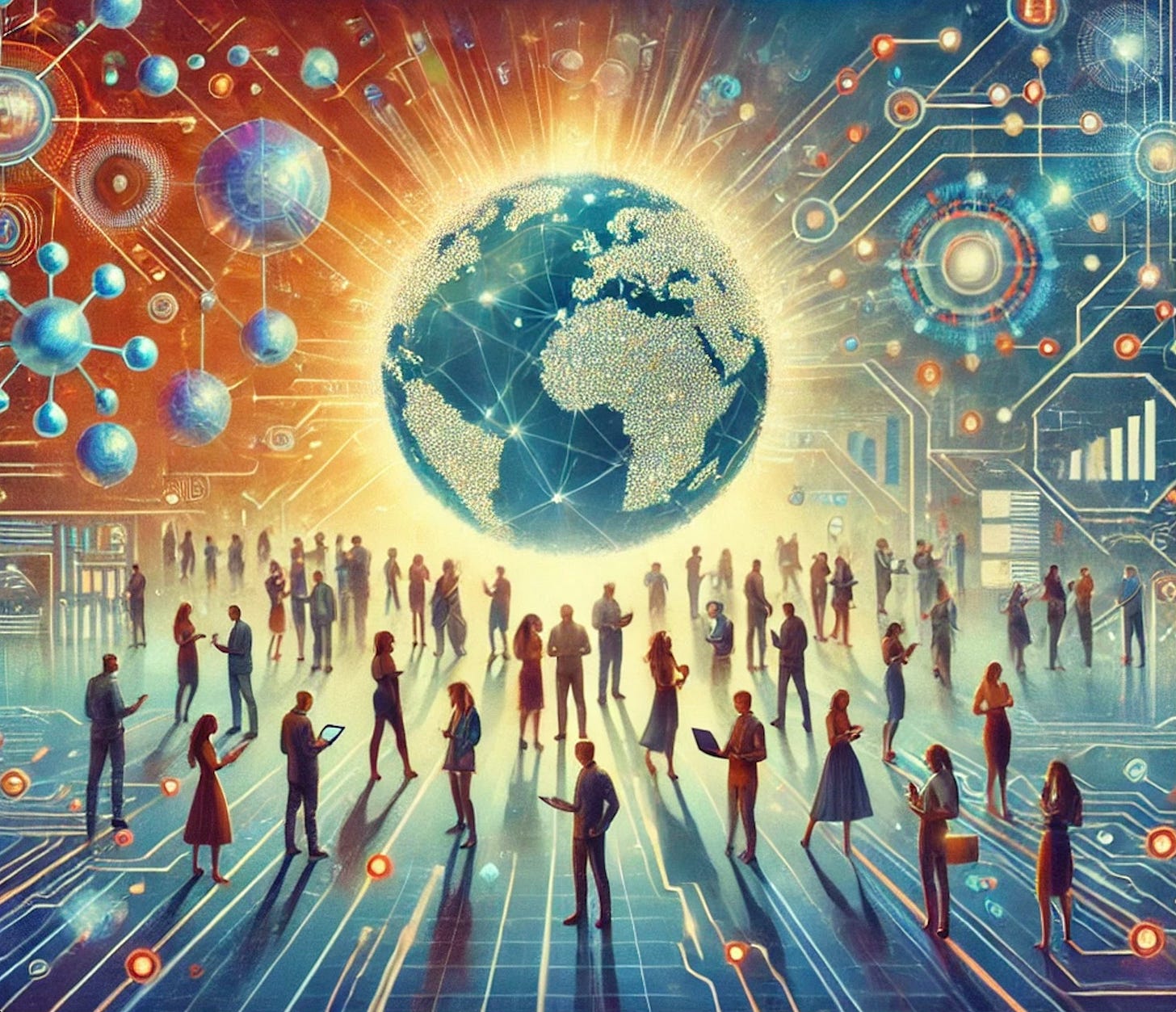The democratization of AI: Shaping our collective future
As we democratize AI, we’re not just distributing technology; we’re distributing the power to shape our future. Here’s what leaders — and everyone else — need to know.
In the annals of technological innovation and history, we stand at a pivotal moment. Just as the internet revolution democratized information and knowledge, we are now witnessing AI drive a societal transformation that can redefine how we live, work, and interact with the world around us.
THE AI RENAISSANCE: FROM IVORY TOWERS TO MAIN STREET
Just a few years ago, training a state-of-the-art language model like GPT-3 was a feat that required immense resources, both in terms of computational power and capital. However, according to a recent analysis, training a model with similar capabilities to GPT-3 would now cost approximately $1.4 million, which represents a reduction of about 70% in just three years. If we consider the latest advancements in AI research, particularly the insights from the “Chinchilla” paper by DeepMind, we can achieve even better performance with smaller, more efficient models.
The Chinchilla researchers found that a 70 billion parameter model trained on 1.4 trillion tokens could outperform GPT-3, despite having less than half the parameters. This finding has profound implications for the economics of AI. It suggests that the path to better AI isn’t necessarily through ever-larger models, but through more efficient training on larger, high-quality datasets.
KEY PLAYERS IN THE DEMOCRATIZATION OF AI
Tech Giants: Increasingly Providing A Platform To Build Upon
Companies like Google, Microsoft, Amazon, and Meta, amongst others through their cloud platforms (Google Cloud AI, Azure AI, and AWS AI services), now offer pre-trained models, development tools, and scalable infrastructure that allow businesses of all sizes to implement AI solutions without massive upfront investments. Google’s TensorFlow and Meta’s PyTorch, open-source machine learning frameworks, have become the go-to tools for AI developers worldwide. These platforms have significantly lowered the barrier to entry for AI development.
Startups: Driving Agile And Nimble Innovation
A new breed of AI startups is focusing on making AI more accessible and applicable to specific industries. Companies like Hugging Face are democratizing natural language processing by providing open-source models and easy-to-use tools for developers. Other startups are creating no-code/low-code platforms that allow non-technical users to implement AI solutions. For instance, Obviously AI enables users to build and deploy machine learning models without writing a single line of code.
Open-Source Communities: Enable Collaborative Progress
The open-source movement has been crucial in democratizing AI. Projects like scikit-learn, Keras, and OpenAI’s GPT models have made powerful AI tools freely available to developers worldwide. These communities foster collaboration, knowledge sharing, and rapid innovation.
Educational Institutions: Nurturing Talent
Universities and online learning platforms are playing a vital role in democratizing AI education. Carnegie Mellon is offering accessible courses on AI and related subjects. Other institutions and platforms like Coursera, edX, and fast.ai are making AI education accessible to millions worldwide. Stanford Professor Andrew Ng’s “AI For Everyone” course, for example, has introduced AI concepts to over 1.4 million learners from diverse backgrounds.
THE ROAD AHEAD: SHAPING OUR AI-DRIVEN FUTURE
The democratization of AI is not just a technological shift; it’s a societal one. As we move forward, different stakeholders have crucial roles to play:
For CEOs And Business Leaders:
Invest in AI literacy for your workforce. Ensure your team understands AI fundamentals and its potential applications in your industry.
Start small, but think big. Begin with pilot projects that can demonstrate quick wins, but have a long-term strategy for AI integration.
Prioritize ethical AI use. Develop clear guidelines for AI implementation that address issues of fairness, transparency, and accountability.
For Policymakers:
Develop adaptive regulatory frameworks that encourage innovation while protecting public interests.
Invest in AI education and infrastructure to ensure your jurisdiction remains competitive in the AI economy.
Address the potential workforce disruption by supporting reskilling and upskilling programs.
For Educators:
Integrate AI literacy into curricula across disciplines, not just in computer science programs.
Collaborate with industry to ensure that AI education aligns with real-world needs.
Use AI tools to enhance your own teaching methods and provide personalized learning experiences.
For Researchers:
Focus on developing AI systems that are not just powerful, but also interpretable and fair.
Collaborate across disciplines to find novel applications of AI in various fields.
Engage with different stakeholders to increase AI literacy and address concerns about AI’s societal impact.
For Students:
Embrace lifelong learning to stay relevant in an AI-driven economy.
Engage in public discussions about AI ethics and governance.
Experiment with accessible AI tools to understand their potential and limitations.
Jensen Huang, Nvidia’s CEO believes AI is “reshaping industries and opening new opportunities for innovation and growth.” Satya Nadella, Microsoft’s CEO, “can’t imagine life without artificial intelligence.” Sundar Pichai, Google’s CEO, recently commented that this is a “once-in-a-generation opportunity to unlock human potential, for everyone, everywhere.”
AI can certainly be all of that and more. However, our driving of the democratization of AI is what will truly represent a pivotal moment in human history. It’s not just about the technological advancement; it’s about ensuring that AI empowers individuals and organizations to solve problems, create value, and shape our collective future. AI will transform our world, but how we can ensure we harness its potential to create a more innovative, equitable, and prosperous society for all?
The future of AI is not just in the hands of tech giants, innovative startups, universities, and researchers; it’s ultimately in your hands, in the hands of educators, entrepreneurs, artists, dreamers, and problem-solvers such as you across all walks of life. As we democratize AI, we’re not just distributing technology; we’re distributing the power to shape our future. The AI revolution is here, and it belongs to all of us.
This article was originally published in Fast Company by Rahul Mewawalla. Rahul Mewawalla, a technology and business leader, has held leadership roles with global companies such as Yahoo, Nokia, and General Electric Company, and has served as CEO, President, and Chairman across high-growth and transformative technology companies. He also served as a board director for several Nasdaq-listed public companies, as Senior Advisor on Innovation to the San Francisco Mayor’s Office, and as Advisor to Stanford University’s Persuasive Technology Lab.




